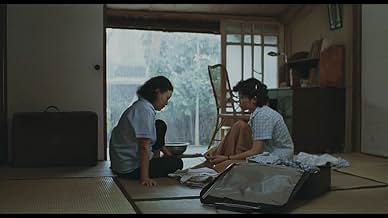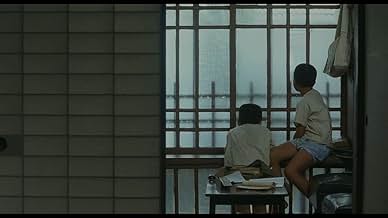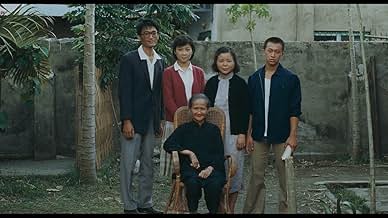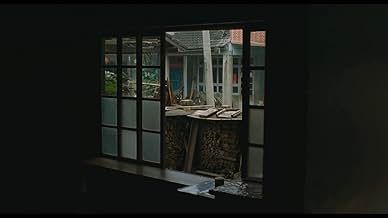IMDb RATING
7.5/10
3.8K
YOUR RATING
The semi-autobiographical film on director Hou Hsiao-Hsien's childhood and adolescence, when he was growing up in Taiwan, living through the deaths of his father, mother and grandmother.The semi-autobiographical film on director Hou Hsiao-Hsien's childhood and adolescence, when he was growing up in Taiwan, living through the deaths of his father, mother and grandmother.The semi-autobiographical film on director Hou Hsiao-Hsien's childhood and adolescence, when he was growing up in Taiwan, living through the deaths of his father, mother and grandmother.
- Awards
- 8 wins & 5 nominations total
- Director
- Writers
- All cast & crew
- Production, box office & more at IMDbPro
Featured reviews
I recommend A TIME TO LIVE AND A TIME TO DIE as a great introduction to the films of Hou Hsiao Hsien, who I consider the greatest director working today. Like most of his films, this one is about the telling of history, the effort to recreate the memories of the past, in this case his childhood memories growing up in rural Taiwan. His family has escaped Communist China but live as if they will make their return someday. That someday never comes, the family grows old, and members die one by one. These tragedies (filmed with heartbreaking solemnity) serve as punctuation marks for the film's narrative, which isn't so much concerned with plot details as it is with capturing the sense of what it was like to live at that time, as the kids develop their own sense of belonging, in a country they have adpoted just as it has adopted them. His method of editing and storytelling is something close to revolutionary, and he would refine it in his later films. His ability to set scene after impeccable scene and let the ideas ferment over their totality is unparalleled. This is perhaps his most accessible film, full of heart and pathos. It may seem slowgoing by Hollywood standards, but if you have the willingness to let it wash over you, you will be transported, both mentally and emotionally.
Very good movie in every aspect: acting, performance, cutting, quality of images, and plot. This is based on the true memories of the life of the director growing up in Taiwan. We follow this evolution in this movie in such realistic and natural images and scenes that we forget we are watching a movie and it looks like if we were watching real life scenes through someone's window. The main plot tells the story of a young boy who is dealing with family and other issues as he grows up during a certain period in Taiwan's history. A fascinating movie. Good foreign arthouse movies are so underrated on imdb and I don't even know why. I guess this site is for popular movies only and top 250 is ridiculous.
Seeking a better life, a teacher brings his family from Mei County in the Kwangtung Province of mainland China to Fengshan in the south of Taiwan in 1947. As a result of the Communist takeover on the mainland, the family is forced to remain in Taiwan, estranged from their traditional home and culture. The Time to Live and The Time to Die, a semi-autobiographical film by Taiwanese director Hou Hsiao-Hsien, is a compassionate story of a family's struggle to adapt to living in a new society. Loosely based on the childhood memories of Taiwanese director Hou Hsiao-Hsien who came to Taiwan in 1948, the film chronicles the passing of the older generation and the emergence of the new. The director narrates the film from the point of view of the youngest son, Ah-Hsiao (You Anshun), called Ah-ha by his grandmother (Tang Yu-Yuen).
The Time to Live is shot in a reflective style that allows an intimacy with the material. In the first half, the family learns to adjust to their new environment: the children play outside, the family eats dinner together and engage in small family rituals. Hou is observant of the political and technological changes taking place in the background, noting, for example, the increasing number of cars and motorcycles on the streets, the installation of electricity in their home, the improving medical treatment that the parents receive, and a letter from an aunt revealing the Great Leap Forward in China. What doesn't change, however, is the continued second class status of women, depicted in a scene where the mother lectures the daughters about their responsibilities for housework and how it must come before an education.
As the family gets older, the longing for their homeland increases. On several occasions, the old grandmother becomes disoriented and asks shopkeepers for directions to the Mekong Bridge (in China). When she gets lost, she has to be returned home via taxicab. The second half of the film painfully shows the loss of parental guidance and the disintegration of the family. As illness sets in, the parent's pain and slow disintegration takes place directly in front of the camera, not in the background. Ah Hsiao and his siblings stoically endure the loss of both parents, but their growing involvement in delinquency and petty crime underscores the loss of structure in their lives.
This is Hou's most personal film and one that is filled with images of extraordinary power. I was moved to see Ah Hsiao face when he sees death for the first time while walking into the room containing his father's body, and when the family shares loving recollections of the father soon after his death. Backed by a lyrical soundtrack, the street scenes and images of family life convey a rare authenticity and visual poetry. As in the film "Pather Panchali" by Satyajit Ray, the tiny village in Taiwan becomes a microcosm of the outside world. Like Ray's masterpiece, it is a sad film, yet, in its celebration of the wonder of life and the strength of the human spirit, it is also triumphant. The Time to Live and the Time to Die is not only a loving tribute of one son to his family but a testament to the strength of all families.
The Time to Live is shot in a reflective style that allows an intimacy with the material. In the first half, the family learns to adjust to their new environment: the children play outside, the family eats dinner together and engage in small family rituals. Hou is observant of the political and technological changes taking place in the background, noting, for example, the increasing number of cars and motorcycles on the streets, the installation of electricity in their home, the improving medical treatment that the parents receive, and a letter from an aunt revealing the Great Leap Forward in China. What doesn't change, however, is the continued second class status of women, depicted in a scene where the mother lectures the daughters about their responsibilities for housework and how it must come before an education.
As the family gets older, the longing for their homeland increases. On several occasions, the old grandmother becomes disoriented and asks shopkeepers for directions to the Mekong Bridge (in China). When she gets lost, she has to be returned home via taxicab. The second half of the film painfully shows the loss of parental guidance and the disintegration of the family. As illness sets in, the parent's pain and slow disintegration takes place directly in front of the camera, not in the background. Ah Hsiao and his siblings stoically endure the loss of both parents, but their growing involvement in delinquency and petty crime underscores the loss of structure in their lives.
This is Hou's most personal film and one that is filled with images of extraordinary power. I was moved to see Ah Hsiao face when he sees death for the first time while walking into the room containing his father's body, and when the family shares loving recollections of the father soon after his death. Backed by a lyrical soundtrack, the street scenes and images of family life convey a rare authenticity and visual poetry. As in the film "Pather Panchali" by Satyajit Ray, the tiny village in Taiwan becomes a microcosm of the outside world. Like Ray's masterpiece, it is a sad film, yet, in its celebration of the wonder of life and the strength of the human spirit, it is also triumphant. The Time to Live and the Time to Die is not only a loving tribute of one son to his family but a testament to the strength of all families.
"A Time to Live and a Time to Die" reads like a family saga, but it is just as much a film about the passing of traditional China and the dislocation of exile. Of course the plot points are given away; Hou isn't interested in dramatic tension and Aristotelian unities--these are so dependent on Western ideas of
personality and the separation of individual and world that they make little
sense in China. He doesn't push the events in our faces, either--they just
happen, often in the middle distance with a tree in the foreground, the way real life happens. (Remember Auden's "Musee de Beaux Arts", with Icarus plunging
in the sea far off while a ploughman works on his field?)
The space Hou gives his events and his characters doesn't give us the intimacy with people that we expect in the West. But it gives us a rich sense of the
texture of life and the things that pass among members of a family and a
community, even one that is thrown together and can just as suddenly fall
apart, as it begins to here. It's that feeling for social space, in part, that allows this film and others of his to address social and historical questions without ever losing the sharp particularity of a personal story.
personality and the separation of individual and world that they make little
sense in China. He doesn't push the events in our faces, either--they just
happen, often in the middle distance with a tree in the foreground, the way real life happens. (Remember Auden's "Musee de Beaux Arts", with Icarus plunging
in the sea far off while a ploughman works on his field?)
The space Hou gives his events and his characters doesn't give us the intimacy with people that we expect in the West. But it gives us a rich sense of the
texture of life and the things that pass among members of a family and a
community, even one that is thrown together and can just as suddenly fall
apart, as it begins to here. It's that feeling for social space, in part, that allows this film and others of his to address social and historical questions without ever losing the sharp particularity of a personal story.
The Taiwanese movie Tong nien wang shi was shown in the U.S. with the title A Time to Live, a Time to Die (1985). The movie was co-written and directed by Hsiao-hsien Hou, and is said to be semi-autobiographical.
The film is a coming of age story of Ah-Ha, whom we meet as a boy of about seven, and whose life we follow until his late teen years. Ah-Ha's family fled China in 1947, and now live in Taiwan. At first, there was still talk about recapturing the mainland, although those discussions faded away as the reality became clear. Still, Ah-Ha's grandmother is convinced that she can walk back to the mainland, and frequently asks people to help her to get there.
If the movie does, indeed, contain autobiographical elements, Hsiao-hsien Hou had a difficult boyhood. His family was poor, and Illness stalked them. As a teenager, Ah-Ha joins a gang that is extraordinarily violent. (The violence takes place off screen, but it is an ever-present plot element in the second half of the film.)
The plot doesn't give us too many heart-rending moments, but it's still very grim. In fact, as I thought back about it, there was only one truly positive scene when—to Ah-Ha's astonishment--his grandmother is able to juggle three guavas. Imagine a movie that is more than two hours long, and has only about 30 seconds of true happiness in it.
It's hard to recommend a movie like this, but, on the positive side, the camera work is brilliant, the acting is excellent, and the film gives us a glimpse of what life was like for a Chinese subculture—people from the mainland who migrated to Taiwan.
We saw this movie at the excellent Dryden Theatre at Eastman House in Rochester, NY as part of a Hsiao-hsien Hou retrospective. It will work well on DVD.
The film is a coming of age story of Ah-Ha, whom we meet as a boy of about seven, and whose life we follow until his late teen years. Ah-Ha's family fled China in 1947, and now live in Taiwan. At first, there was still talk about recapturing the mainland, although those discussions faded away as the reality became clear. Still, Ah-Ha's grandmother is convinced that she can walk back to the mainland, and frequently asks people to help her to get there.
If the movie does, indeed, contain autobiographical elements, Hsiao-hsien Hou had a difficult boyhood. His family was poor, and Illness stalked them. As a teenager, Ah-Ha joins a gang that is extraordinarily violent. (The violence takes place off screen, but it is an ever-present plot element in the second half of the film.)
The plot doesn't give us too many heart-rending moments, but it's still very grim. In fact, as I thought back about it, there was only one truly positive scene when—to Ah-Ha's astonishment--his grandmother is able to juggle three guavas. Imagine a movie that is more than two hours long, and has only about 30 seconds of true happiness in it.
It's hard to recommend a movie like this, but, on the positive side, the camera work is brilliant, the acting is excellent, and the film gives us a glimpse of what life was like for a Chinese subculture—people from the mainland who migrated to Taiwan.
We saw this movie at the excellent Dryden Theatre at Eastman House in Rochester, NY as part of a Hsiao-hsien Hou retrospective. It will work well on DVD.
Did you know
- TriviaThis film is inspired by screenwriter-turned-director Hou Hsiao-Hsien's coming-of-age story. It is the second installment of Hou Hsiao-Hsien's "Coming-of-Age Trilogy" that features three prominent Taiwanese screenwriters' coming-of-age stories - the other two are Un été chez grand-père (1984) (inspired by the childhood memories of Chu Tien-Wen) and Poussières dans le vent (1986) (inspired by the coming-of-age story of Wu Nien-Jen).
- ConnectionsFeatured in When Cinema Reflects the Times: Hou Hsiao-Hsien and Edward Yang (1993)
- How long is A Time to Live and a Time to Die?Powered by Alexa
Details
- Release date
- Country of origin
- Official site
- Languages
- Also known as
- A Time to Live and a Time to Die
- Filming locations
- Production companies
- See more company credits at IMDbPro
Contribute to this page
Suggest an edit or add missing content










